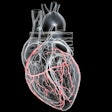
An international collaboration has begun to develop personalized treatments for patients with cardiovascular disease, combining genetic analysis and better integration of health data.
The NextGen project – a consortium of 21 clinical research and other bodies – was launched by the European Society of Cardiology (ESC) in Utrecht, the Netherlands.
It is funded with a 7.6 million euro ($8.2 million) grant from Horizon Europe, the EU’s research and innovation funding program.
The project aims to speed up diagnosis, monitoring, and treatment of cardiovascular disease (CVD), a leading cause of mortality worldwide which costs Europe’s economy €282 billion euros ($305 billion) each year and has profound impacts on individuals, such as disability and premature retirement.
The approach looks to break down barriers to data integration in CVD research and draw on advances in Artificial Intelligence (AI) methodologies to evolve personalized treatments.
The NextGen consortium includes universities, small and medium enterprises (SMEs), and professional associations. The European Society of Cardiology, an independent nonprofit organization, said the project would address challenges in CVD research such as variation in data standards and data volume and will aim to “integrate diverse data sources securely and ethically.”
“No two people are exactly the same, and so it makes sense that each person needs a slightly different strategy to optimize their health,” said project coordinator Professor Pim van der Harst of University Medical Center Utrecht in a statement.
“To develop individualized therapies, we need to compile as much information as possible about individuals, and that’s where NextGen comes in. The unique picture we generate will then form the basis for improving cardiovascular health and wellbeing,” he said.
Consortium participants include the ESC, the nonprofit organization MyData Global, the Drug Information Association, WellSpan Health, the Karolinska Institute, the University of Virginia, and Queen Mary University.
“This is a tremendous opportunity and a challenge we have in building the right toolbox that will allow [us] to unite CVD patient data across Europe and implement precision medicine to improve cardiovascular healthcare,” Consortium member Professor Panos Deloukas of Queen Mary University said.



















